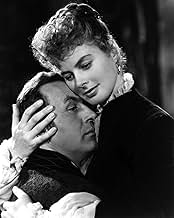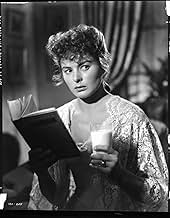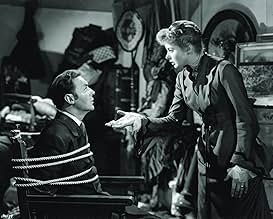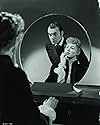Una joven y su nuevo marido se mudan a la casa en la que años antes asesinaron a su tía. Sin embargo, él guarda un secreto que debe proteger a toda costa, incluso si eso supone volver loca a... Leer todoUna joven y su nuevo marido se mudan a la casa en la que años antes asesinaron a su tía. Sin embargo, él guarda un secreto que debe proteger a toda costa, incluso si eso supone volver loca a su mujer.Una joven y su nuevo marido se mudan a la casa en la que años antes asesinaron a su tía. Sin embargo, él guarda un secreto que debe proteger a toda costa, incluso si eso supone volver loca a su mujer.
- Dirección
- Guionistas
- Elenco
- Ganó 2 premios Óscar
- 10 premios ganados y 7 nominaciones en total
- Miss Thwaites
- (as Dame May Whitty)
- Policeman
- (sin créditos)
- Young Girl
- (sin créditos)
- Cab Man
- (sin créditos)
- Pedestrian
- (sin créditos)
- Pedestrian
- (sin créditos)
Opiniones destacadas
Ingrid Bergman and Charles Boyer work very well in the two leads, and they get considerable help from the rest of the cast and the production.
The character of the fragile, self-doubting Paula is an ideal role for Bergman, who conveys Paula's anxious uncertainty while keeping her sympathetic and even engaging. Boyer likewise comes across very believably as her calculating husband, and the two leads make their characters into a strong foundation for the tense story.
Joseph Cotten does not really seem as if he could be a Scotland Yard detective, but in a more general way, he succeeds pretty well as a sympathetic policeman who wants to help personally while striving to get at the facts of the matter. A very young Angela Lansbury gives her character some pointed moments, and she becomes a useful part of creating the right atmosphere.
The story does, of course, have some less plausible elements, but it is written carefully enough that the seams rarely show. In fact, it seems to have been constructed rather carefully, so as to provide subtle hints that can be made use of later on. It all makes for a satisfying drama that also provides a pretty good showcase for its stars.
Great performances all round.
The actress -- who would soon become blacklisted after her marriage to Italian director Roberto Rossellini -- can convey every emotion and nuance of her character through her amazingly expressive eyes. Completely believable in George Cukor's Gaslight as a wife whose husband (Charles Boyer) is trying to make insane, Bergman can show you all her turmoil and emotional stress just by looking around.
The plot is simple, perhaps even arcane. A famous opera singer is murdered in London, leaving behind no motive, no clues, and Paula, the young niece who discovered the body. Paula is sent to Italy, where she, too, studies music, until she elopes with an older, dashing pianist (Boyer). He convinces her to move back to the exact same house where her aunt was murdered, where nothing has been changed in all those years. And, naturally, here is where the movie really begins.
Soon, her husband starts acting very strangely, and starts convincing her that she is very ill and unable to go out. Trapped in the house, alone with her husband, a somewhat-deaf cook, and a tart of a housekeeper, Paula soon starts to hear noises, see things, lose things, and even hide things. Or is she? Is she going mad? Or is her husband -- who she is supposed to love, honor, and obey -- making her mad?
The show is Bergman's to steal, and she does so with gusto, garnering an Oscar for her endeavor. With her performance, Bergman transforms the character of Paula Alquist from a weak, paranoid wimp of a wife into a woman struggling with her own identity and her role in marriage and society. Perhaps unintentionally, perhaps unwittingly, Bergman's Paula is a symbol and a superhero for all women trapped in an abusive marriage. Even today.
Granted, the story line is somewhat contrived, and one can't help but wonder how Paula never notices that her husband is completely evil BEFORE the marriage. Also, Joseph Cotten, as the Scotland Yard detective smitten with Paula's beauty, seems to come out of nowhere. Still, the acting prevails over the plot, and what better actor to come out of nowhere than Cotten? His charm and charisma make up for his character's two-dimensionality.
Although there are faults, Gaslight is an extraordinary film, generating its suspense not from an evil lurking in the shadows, but from the psychology of the mind itself. Perhaps one of the first "pure" psychological thrillers, Gaslight, just like Ingrid Bergman's eyes, contains the perfect blend of mystery, suspense, and beauty.
Indeed, enduring the psychological torture he applied to his love-seeking wife Paula, played by an emotionally versatile Ingrid Bergman, was such an infuriating experience that I left almost one decade between the first and the second viewing, and I literally tiptoed to the DVD to force myself to refresh my memory. After the first fifteen minutes, just when I thought I could stand it, I realized that any horror movie would have been more supportable... or am I overreacting?
I think there must have been some strong reaction toward that novelty of a plot where a person drove another one insane through mental manipulation to the point that "gas light" became part of common language... that's how impactful it was. Not many movies deal with that particular device, but this is how "Gaslight" was revolutionary and sophisticated in a twisted way, suiting the emerging noir genre.
The "gas light" effect referring to the dimming of the light that made Paula believe she was going crazy isn't effective on a narrative level because it's driven by a fact but rather by the seeds of doubt it sows on her mind. We know for a fact that a woman is being manipulated but only suspicion can heal her from her husband's cruel dominance.But she can't suspect him because she loves him in a way that echoes Stockholm Syndrome and he's a Machiavellian gourmet who knows exactly the amount of cruelty and suavity to apply.
Charles Boyer's with all these cunning eyes, that mouth always wary about not letting a word slip, and his faux-affable "French lover" manners, elevate his characters to summits of vileness and gaining extra altitude by a symmetric effect with Ingrid Bergman who brings an extraordinary level of pathos while maintaining a strange aura of dignity. This is a woman whose heart and mind are slowly shred to pieces but she's resigned to believe any word of her beloved husband because she can envision anything except such capability of vileness.
Why would the gaslight dim every night? Why would she hear noises the servant doesn't notice and why would Gregory be wrong if the second maid wasn't so arrogant and defiant? Even Angela Lansbury in her screen debut is perfect in the role of Nancy, the street smart and slightly slutty maid whose deadpan and snarky attitude is more affecting than any hint of false empathy or true detachment. This is a free-spirited woman yet manipulated by the way Gregory exploits every element of the environment and every possible situation. So what we have is a conspiracy perfectly oiled where Cukor makes us witness the action while making us as powerless as Paula. We're like passive observers bound and gagged and undergoing the villain's sadism. In a way, if we consider anger as a brief madness, we're also being "gaslighted" by Cukor.
The mark of great films is to elicit strong responses; and watching "Gaslight" a second time reminded me of something I meant as a compliment after my initial viewing, I thought it was the most Hitchcockian non-Hitchcock film... and the presence of Dame May Whitty or Joseph Cotten play like interesting nods to "The Lady Vanishes" and "Shadow of a Doubt". In"Vanishes", the main protagonist was toyed with her own certitudes and lured into doubting her own sanity and "Shadow" is about a villain who's a close parent. "Gaslight" makes these two plot points converge beautifully but there is another Hitchcock classic it bears a kinship with: "Suspicion".
And I think I can now be more explicit about what bothered me with "Suspicion" and that makes "Gaslight" a superior movie. In "Suspicion", the husband's guilt was the central theme but worked as a double edged word, if he was guilty, then he left too many hints to be a believable villain, if he wasn't, it was anticlimactic. In "Gaslight", we know the villain from the start and we know he's good at hiding his vileness (the essence of 'gaslighting') and the frustration doesn't come from the act but the lack of suspicion, the point is the psychological struggle within a woman whose passion blinds her mind and endangers it, a woman who trades her self-esteem for the sake of the most harmful person she could ever meet.
"Gaslight" foreshadowed, no pun intended, the way film noir would dominate post-war cinema, at a time where many people were blinded by patriotism and driven to real madness by leaders who had contempt for them. "Gaslight" is also a marvel of film noir in its use of the nightmarish fog of London Victorian streets used as the perfect camouflage for a Jekyll/Hyde villain, and where d the walls of respectability of an ordinary house, hid the claustrophobic nightmare of a woman lost among so many useless items and trophies, being the most precious one of all... or the most disposable.
Boyer, Lansbury were all Oscar-nominated, but it was Bergman who won the first of her three Oscars and deservedly so. In what could have been a one-note performance she explores every possible shade of fragility, doubt and panic, disbelief and resignation, whiplash moods orchestrated by her evil husband until her shining moment at the end, perhaps one of the most satisfying cinematic rants, when the whole scheme of Gregory backfires in the most delightful way.
But I still wonder why he wasn't listed in AFI's Top 50 villains, the film made the "thrills" list but hey, who made the thrills?
¿Sabías que…?
- TriviaWhen this movie was produced, MGM attempted to have all prints of the previous version, Gaslight (1940), destroyed. These efforts were ultimately unsuccessful, though the movie was rarely seen for the next few decades.
- ErroresWhen Paula finds the letter in her aunt's music score, Gregory crumples up the letter and jams it into his pocket. Later, when she finds the letter in Gregory's desk, it's neatly folded, with no evidence of crumpling.
- Citas
Paula Alquist Anton: If I were not mad, I could have helped you. Whatever you had done, I could have pitied and protected you. But because I am mad, I hate you. Because I am mad, I have betrayed you. And because I'm mad, I'm rejoicing in my heart, without a shred of pity, without a shred of regret, watching you go with glory in my heart!
- Créditos curiososThe opening and closing credits are displayed over a background of a burning gaslight. If you look at the shadow on the wallpaper, you see a man strangling a woman.
- Versiones alternativasExists in a computer-colorized version.
- ConexionesEdited into Hollywood: The Dream Factory (1972)
Selecciones populares
- How long is Gaslight?Con tecnología de Alexa
Detalles
Taquilla
- Total a nivel mundial
- USD 2,391
- Tiempo de ejecución1 hora 54 minutos
- Color
- Relación de aspecto
- 1.37 : 1
Contribuir a esta página




































